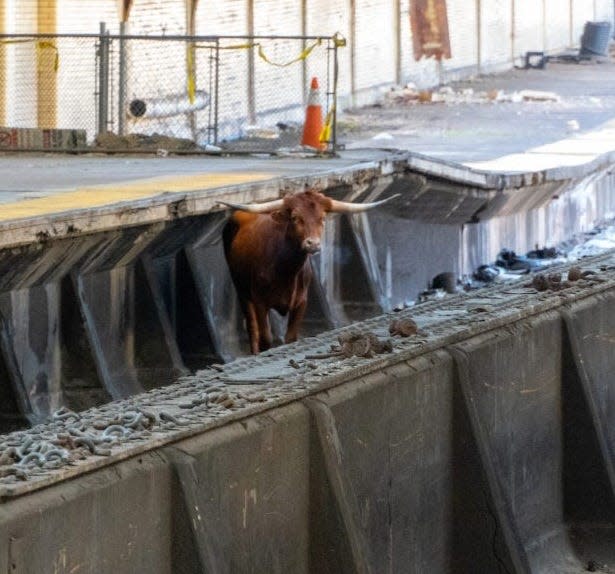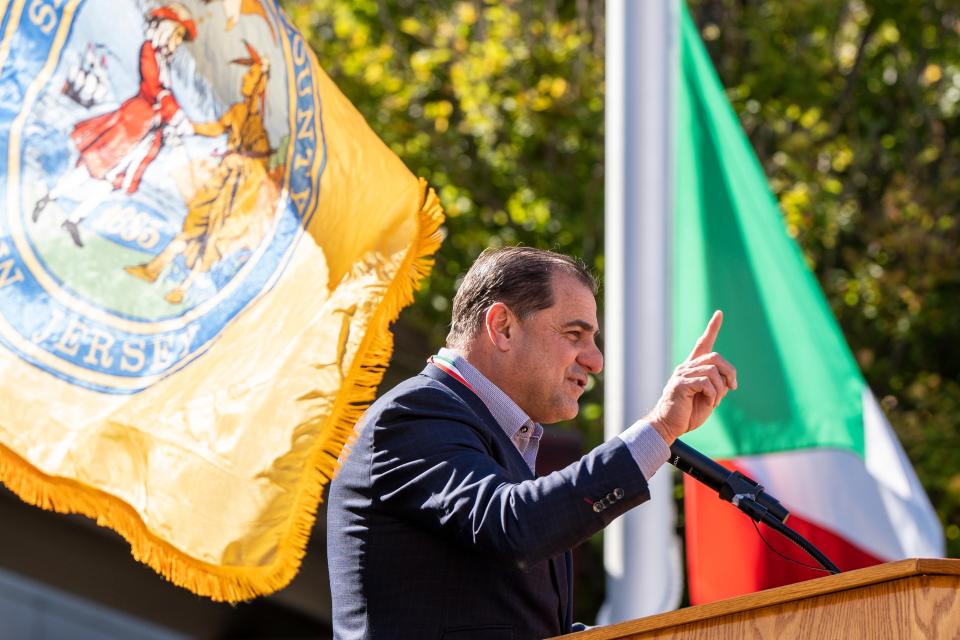The bull that halted trains in Newark? It was a visual metaphor for NJ Transit fiscal woes
- Oops!Something went wrong.Please try again later.
When a stray bull paced the tracks at Newark Penn Station on Thursday, bringing train traffic to a halt, it unwittingly provided a visual metaphor for the perilous state of NJ Transit finances — and how without swift action from pacing politicians in Trenton, potential service cuts could soon halt some trains for good.
The nation's third largest provider of bus, rail and light rail transit faces a looming deficit of $120 million in the 2024-25 fiscal year operating budget and a nearly $1 billion shortfall the following year.
And there’s still no sign of a fiscal resolution from Gov. Phil Murphy, the Legislature or state agency officials.

In recent weeks, two of four politicians in New Jersey who have the most power over the state budget punted on the issue.
Gov. Phil Murphy told reporters in November that “the issue is not hanging over our head tomorrow.”
State Sen. Paul Sarlo, who has chaired the budget committee for 13 years, where NJ Transit’s perennial financial woes are aired annually, acknowledged the problem at a recent event, but said he “wasn’t sure” what a solution would look like yet.
Nicholas Scutari, the Senate president and also among that quartet of budget power brokers, recently threw his support behind reinstating the sunsetting corporate business tax surcharge that transit advocates have pushed for months, but Murphy is staunchly against that.
Craig Coughlin, the Assembly speaker and the fourth in the group, hasn’t spoken publicly on the matter.
And this week, agency officials from the Department of Transportation and NJ Transit — which in April announced they were launching a restructuring analysis of the agency — offered no plan and instead indicated a consultant was being retained.
Leaving things to last minute causes mistakes

Sen. Anthony Bucco, the Republican minority leader, said by letting this issue fester it could force state legislators to make last-minute decisions.
“Whenever things are left to the last minute and becomes an emergency and has to be addressed quickly — mistakes are made,” he said. “And that’s a shame because those mistakes almost always negatively impact the taxpayer.”
More: Murphy says 'everything on table' to solve NJ Transit fiscal woes. Except corporate tax
Since NJ Transit’s creation in 1979, the New Jersey Legislature and governors alike have failed to provide a permanent, secure source of revenue, an anomaly compared to other major transit agencies across the country.
New York, by comparison, has passed multiple laws in recent years that dedicate new surcharges, fees and taxes to support the Metropolitan Transportation Authority and stave off potential financial crises.
Leave funding to whims of politicians

NJ Transit, however, has relied year after year on the whims of politicians to allocate money in the state budget to help supplement its fare revenue.
That only makes it harder for the agency to deal with its looming fiscal shortfalls without resorting to layoffs and service cuts, experts have said.
In 2016, the agency also faced a $120 million budget gap, which was solved by reducing or ending service on eight bus and train routes that resulted in $56 million in savings. The remaining balance was offset through $42 million in internal agency cost-cutting, such as reducing overtime and contract renegotiations, and an additional $22.1 million in state aid.
Just like the scared and frantic bull on the Newark Penn tracks Thursday, NJ Transit customers are starting to fear the worst as the likelihood of service cuts and fare hikes loom without planning, creative ideas and new revenue sources.
Former state senator and outgoing NJ Transit board member Bob Gordon offered an idea for his former colleagues in Trenton to consider that could generate new revenue.
More: NJ Transit to gain revenue from new housing at Metropark station. A recipe for elsewhere?
"If a property developer is going to build a project that increases demand for transit services, that developer should contribute funds to alleviate the stress on the system," Gordon said during his closing remarks at this week's board meeting. "This mechanism will not generate the total revenue required, but could contribute to a funding package."
"I urge my friends and former colleagues in the Legislature to make NJ Transit funding reform a major priority in the upcoming session of the Legislature," he said.
In the end Thursday, that bull on the Newark Penn tracks was safely corralled, given the nickname Ricardo, and moved to a Sussex County sanctuary — and trains started to move again.
There are but a few months left before Murphy will present his next state budget and set the tone about how precious state revenue will be disbursed to state agencies, including NJ Transit.
Will long-pacing New Jersey politicians take on the role of matador and find a way to slay NJ Transit’s financial problems?
Time will tell.
This article originally appeared on NorthJersey.com: Bull that delayed trains a metaphor for NJ Transit fiscal woes

